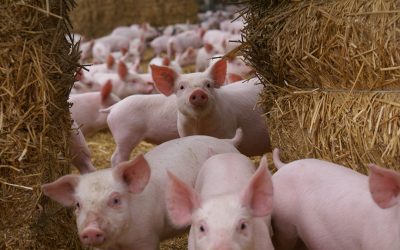Be careful with high amounts of DDGS
The University of Alberta is cautioning pig producers to pay particular attention to the nutritional aspects of diet as they increase the content of by products (such as DDGS) from biofuel production in their rations.
up corn and wheat prices and increased the availability of by products, like
corn and wheat dried distillers grains. University of Alberta feed industry
research chair Dr. Ruurd Zijlstra says there are several concerns related to
higher inclusion of these by products in rations to keep in mind.
High
content of vomitoxin
One of them would be mycotoxin content particularly
in parts of North America where we use grains that have a high content of vomitoxin. This vomitoxin would not be destroyed by the
production of ethanol during the fermentation process.
A second concern
would be, especially for corn dried distillers grain, is very high in fat and
all of this fat ends up in the carcass and corn oil is actually a very soft fat
so, if you have a very high inclusion rate of dried distillers grain, it actual
results in carcasses of a less than desirable quality and the third one would
simply be just as for any alternative feed stuff what is the impact on
performance.
If you see reports on formulating diets on digestible energy and
total amino acids that would be part of the reasons why you sometimes see a
reduction in performance when you start feeding higher levels of byproducts,
where as if you formulate your diets properly there would be less of a
concern.
Dramatic variation
Zijlstra notes the
quality of these by products can vary dramatically from processing plant to
processing plant.
He recommends partnering with the by products producer to
identify ways, whether through contracting or specific sourcing, to reduce the
variability of these ingredients.











